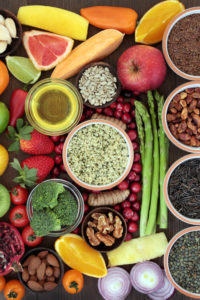Flavonoids: 6 Health Benefits of This Family of Antioxidants
You’re probably already aware of how beneficial antioxidants are to your health and longevity, but did you know that there are many different types of antioxidants? Some types you may already know: vitamins A, C, and E, as well as beta carotene and manganese. But flavonoids have their own set of functions and benefits. Read on to learn more about this important group of antioxidants.
What Are Flavonoids?
Flavonoids are a family of polyphenolic plant compounds that are categorized into six major subclasses: flavones, anthocyandins, flavonones, isoflavones, flavonols, and flavanols. They naturally occur in various fruits, vegetables, and beverages. In both plants and animals, flavonoids act as antioxidants, which means that they are able to neutralize free radicals and prevent them from damaging the body.
Get Your Nutrition Guide
Do you want to eat foods that help you feel better, stay slim, and avoid diet-related diseases? Do you want to be healthier by eating delicious “super” foods?
If so, claim your FREE copy, right now, of the definitive nutrition guide on living a longer, healthier, happier life.
Benefits of Flavonoids
Each type of flavonoid has its own benefits, but generally, here’s what they can do for your health:
- Flavonoids have anti-inflammatory properties. This is particularly beneficial for preventing and treating chronic inflammatory diseases such as asthma, arthritis, and diabetes.
- They lower your risk of heart disease. Studies show that people who eat more flavonoid-rich foods are nearly 20 percent less likely to die of heart attack or stroke than those who ate the least.
- Flavonoids lower your risk of cancer. Research is ongoing, but there is scientific data that suggests that flavonoid consumption may be tied to the prevention of gastric, pancreatic, and or oropharyngeal cancers.
- They can help you lose weight. One study analyzed the diet and exercise habits of 124,000 middle-aged and older people and found that those with a flavonoid-rich diet maintained their weight better than those who didn’t.
- Flavonoids can help lower your risk of developing type 2 diabetes. A recent study found that participants with a higher intake of flavonoids had a 10 percent lower risk of type 2 diabetes than those with a lower intake.
- They can boost your bone health. According to research published in the Journal of Nutrition in Gerontology and Geriatrics, flavonoids have “the most potential of dietary components for promotion of bone health beyond calcium and vitamin D.”
Foods That Are Rich in Flavonoids
If any of the following foods are a regular part of your diet, you may already be getting an adequate source of flavonoids:
- Fruits, such as berries, grapes, apples, pears, stone fruits, and citrus fruits
- Vegetables, particularly green and red vegetables, onions, and nightshades
- Chocolate
- Beverages, such as red wine, tea, vegetable juice, and fruit juice
- Spices, such as dill, thyme, capers, and parsley
- Nuts, such as walnuts, pecans, pistachios, and cashews
- Legumes, such as black, kidney, pinto, and fava beans
Flavonoid Types
Under each flavonoid subclass are subgroups that each have their own specific health benefits. In the chart below, you’ll find each flavonoid subclass, examples of subgroups, their benefits, and which foods are the highest sources of each flavonoid.
| Type | Subgroup | Benefit | Source |
| Flavones | Luteolin, apigenin | Overall antioxidant benefits | Celery, parsley, herbs, hot peppers |
| Anthocyandins | Malvidin, pelargondin, peoidin, cyandin | Hearth health, obesity and diabetes prevention | Berries, plums, grapes, red wine |
| Flavonones | Hesperetin, eriodictyol, naringenin | Cardiovascular health, relaxation, anti-inflammatory | Citrus fruits |
| Isoflavones | Genistein, glycitein, daidzein | Possible reduction of cancer risk, menopausal symptoms | Legumes |
| Flavonols | Quercetin, kaempferol | Anti-inflammatory; chronic disease prevention | Onions, leeks, Brussels sprouts, kale, broccoli, tea, berries, apples, beans |
| Flavanols | Catechins, dimers, polymers | Cholesterol reduction; cardiovascular and neurological health | Chocolate, berries, apples, grapes, fava beans, wine |
Source: LiveScience.com
How to Get Flavonoids Into Your Body
There is no daily value suggestion made by the FDA for flavonoids, but what is recommended is a balanced diet that contains plenty of fruits, vegetables, whole grains, beans, and nuts, which will ensure that you consume the right amount of vitamins, minerals, and antioxidants.
Most flavonoids are also available as supplements. Subgroups such as quercetin, hesperetin, and rutin, often are sold in pure form, while others are available via plant and fruit extracts, such as green tea, elderberry, and black current.
According to Oregon State University, no adverse effects have been associated with high dietary intakes of flavonoids from plant-based sources. However, it’s important to note that the safety of flavonoid supplements in pregnant and breastfeeding women has not been established.
Flavonoid supplements have been found to inhibit the effects of certain medications, such as anticoagulant and antiplatelet drugs, as well as ATO-binding cassette (ABC) drug transporters within the body, which could increase the toxicity of certain medications. Therefore, it’s important to speak with your doctor before taking any flavonoid supplements.
CAN FLAVONOIDS REDUCE TINNITUS SYMPTOMS?
Over the last few years, a flavonoid supplement called Lipo-Flavonoid has been marketed as a treatment for tinnitus, vertigo, earaches, ear infections, and Meniere’s disease. The main ingredient in these supplements include eriodictyol glycoside, vitamins B and C, choline, and inositol. But does it actually work?
Well, the American Academy of Otolaryngology-Head and Neck Surgery has stated that it doesn’t recommend Lipo-Flavonoid due to lack of evidence. Also, a recent study conducted by the American Academy of Audiology wasn’t able to conclude whether Lipo-Flavonoid was an effective treatment for tinnitus.
The post Flavonoids: 6 Health Benefits of This Family of Antioxidants appeared first on University Health News.
Read Original Article: Flavonoids: 6 Health Benefits of This Family of Antioxidants »
Powered by WPeMatico


